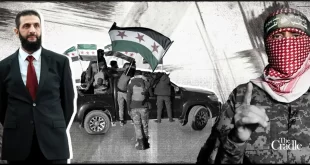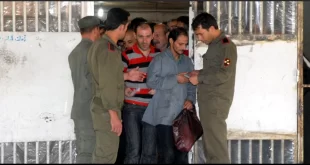Nov 26, 2014, Al Akhbar
At a desert base, Gulf state Qatar, with the help of the United States, has been covertly training the so-called “moderate” Syria rebels to fight the Syrian army and the Islamic State of Iraq and Syria (ISIS) group as well as other extremist groups for over a year, sources claimed Wednesday.
Meanwhile, Russian President Vladimir Putin met Syrian Foreign Minister Walid al-Moualem in Russia’s Black Sea resort of Sochi for talks Wednesday, the Kremlin said.
The camp, south of the capital between Saudi Arabia’s border and Udeid area, the largest US air base in the Middle East, is being used to train the Free Syrian Army (FSA) militants and other so-called “moderate” rebels, the sources said.
Reuters could not independently identify the participants in the program or witness activity inside the base, which lies in a military zone guarded by Qatari special forces and marked on signposts as a restricted area.
But Syrian rebel sources said training in Qatar has included rebels affiliated to the FSA from northern Syria.
The sources said the effort had been running for nearly a year, although it was too small to have a significant impact on the battlefield, and some rebels complained of not being taught advanced techniques.
The training is in line with Qatar’s constant meddling in regional affairs.
Small groups of 12 to 20 militants are identified in Syria and screened by the Central Intelligence Agency (CIA), the sources said.
Once cleared of links with jihadist factions, they travel to Turkey and are then flown to Doha and driven to the base, though it wasn’t clear how the militants are ‘cleared’ of jihadist links.
Qatar and the “Islamic Front”
Retired US general John Allen, who is leading the international effort against ISIS extremists, said last month that the training of so-called “moderate” rebels would be a slow process.
“It is going to take a while, it could take years, actually,” Allen said in an interview with CNN. “We have to manage our expectations.”
The US Congress has approved the training and equipping of “moderate” rebel units as part of an international plan to defeat ISIS in Iraq and Syria.
Allen said the training of rebels was already under way.
“The process of getting that unfolded is occurring right now with the idea of locating training camps and beginning to accumulate the Syrian elements that will go into those training camps,” he said.
Meanwhile, a Western source in Doha said,”the US wanted to help the rebels oust Assad but didn’t want to be open about their support, so to have rebels trained in Qatar is a good idea, the problem is that the scale is too small.”
The CIA declined to comment, as did Qatar’s foreign ministry and an FSA spokesman in Turkey.
“Moderate rebels from the FSA and other groups have been flown in to get trained in things like ambush techniques,” said a source close to the Qatari government who asked not to be named due to the sensitivity of the topic.
“The training would last a few months, maybe two or three, and then a new group would be flown in, but no lethal weapons were supplied to them,” one of the sources said.
It is not clear whether the Qatari program is coordinated with a strategy of other Western and Gulf countries to turn disparate “non-Islamist rebel groups” into a force to combat ISIS and the Syrian army.
Such efforts have been hampered by Western hesitancy about providing significant military aid, because it could end up with extremists.
As the war against Assad and the Syrian army has dragged on, frustrated rebels asked their trainers for more advanced techniques, such as building improvised explosive devices (IEDs), requests which were always denied.
“They complain a lot and say that going back they need more weapons or more training in IEDs but that’s not something that’s given to them,” said a Qatar-based defense source.
The Qatar project was conceived before the declaration of the “ISIS group,” when militants belonging to its predecessor organization, the al-Qaeda linked al-Nusra Front, and other hardline Islamist groups were not regarded by world powers as a security threat.
ISIS’ rise in Syria and Iraq has hampered the rebellion: “moderate groups” cannot fight Assad when the better-armed ISIS seeks their destruction as it strives to build its “caliphate.”
In recent weeks, the Qataris, disappointed by lack of progress in the fight against Assad, have started to consider training members of the Islamic Front, a coalition of Islamist militants weaker than ISIS or Nusra, but stronger than the FSA.
Some analysts say screening Islamic Front fighters would be harder than FSA rebels, since some Islamists have switched between various groups.
None have been trained yet, but Qatar has sought to identify candidates, the sources said, without adding any further details on the factors taken into consideration.
However, a source who works with rebel groups said Qatar had delivered weapons, mostly mortar bombs, to the Islamic Front and some FSA brigades about two months ago and had paid some salaries for Islamic Front groups.
Gulf States, the US and ISIS
Training fighters from Islamic groups could displease fellow Gulf state the United Arab Emirates, which dislikes Qatar’s support for the Muslim Brotherhood’s international Islamist network.
But Saudi Arabia, which shares the UAE’s mistrust of the Brotherhood, is more indulgent of “moderate” Islamist forces when it comes to fighting Assad, diplomats say.
Asked about the Qatari training, a Saudi defense source said: “We are not aware of this training camp, but there’s one thing we agree on: Assad needs to go and we would not oppose any action taken towards that goal.”
To Qatar, ousting Assad remains a priority and youthful Emir Sheikh Tamim has said that military efforts to tackle ISIS will not work while the Syrian president remains in power.
Gulf states dislike the West’s emphasis on fighting ISIS, the world’s wealthiest terrorist group, as they claim Assad and the Syrian army are the bigger problem.
US President Barack Obama said in September the US, which is leading an international coalition ineffectively bombing ISIS targets in Syria and Iraq, wanted to train and equip FSA rebels to “strengthen the opposition as the best counterweight to the extremists” and to prevent US troops from being dragged into another ground war.
However, Allen told the Asharq al-Awsat daily last month that the US does not expect Syrian rebels it plans to train to fight ISIS to also take on the Syrian army.
Allen said there was a need to build up the credibility of the “moderate” Syrian opposition at a political level.
“But the intent is not to create a field force to liberate Damascus – that is not the intent,” he asserted.
The US decision to train and equip rebel groups in Syria was criticized by several renowned officials who warned of dire consequences.
Following Obama’s speech, former US Congressman Ron Paul, an outspoken anti-interventionist, denounced in an interview with Russia Today US plans to arm and train the rebels, noting that these Western-backed forces have been “helpful to ISIS.”
“The FSA turned over the weapons, that we (the US) sent them, to ISIS,” Paul said. “It is pretty well recorded that for $50,000 the FSA turned over one of the two American journalists to ISIS.”
In his article, Kucinich quoted historian Alastair Crooke who described “moderate” rebels in Syria as being “rarer than a mythical unicorn,” and warned that “funding Syrian rebels will precipitate a new and wider war in the Middle East.”
“Saudi Arabia, which, with Qatar funded the jihadists in Syria, is now offering to ‘train’ the rebels,” which means that “the sponsors of radical jihadists are going to train ‘moderate’ jihadists,” Kucinich added.
Kucinich also described the US Treasury as becoming the “piggy bank” of ISIS.
“The US has supplied weapons to the Iraqi government and to Syrian rebels which have ended up in the hands of ISIS,” he explained. “As a result, the US Air Force has been bombing Humvees and armored troop carriers purchased with US taxpayer money.”
A recent study by the London-based small-arms research organization Conflict Armament Research revealed that ISIS jihadists appear to be using US military-issued arms and weapons supplied to the “moderate” rebels in Syria by Saudi Arabia.
The report said the jihadists disposed of “significant quantities” of US-made small arms including M-16 assault rifles and included photos showing the markings “Property of US Govt.”
It also found that anti-tank rockets used by ISIS in Syria were “identical to M79 rockets transferred by Saudi Arabia to forces operating under the Free Syrian Army umbrella in 2013.”
Russian and Syrian talks
In an interview earlier this month, Syrian Foreign Minister Walid al-Muallem confirmed that Qatar attempted to reconcile with the Syrian government but the latter rejected.
“The Syrian people will not accept a reconciliation unless Qatar takes the initiative to halt support for terrorists, and to stop the campaign against Syria and its army,” Muallem said.
Meanwhile on Wednesday, President Vladimir Putin met Muallem in Russia’s Black Sea resort of Sochi for talks, the Kremlin said.
Kremlin spokesman Dmitry Peskov said Putin and Muallem were discussing “bilateral relations,” declining further comment.
Muallem’s two-day visit to Russia, a key ally of Assad, appears to be the latest move in a renewed diplomatic effort by Moscow to restart peace talks aimed at seeking a solution to the Syria crisis.
But Western diplomats and analysts say the push is not likely to bear fruit because of splits over the fate of Assad.
Muallem was also due to meet Russian Foreign Minister Sergei Lavrov.
 Syria Support Movement solidarity with the Syrian people
Syria Support Movement solidarity with the Syrian people




